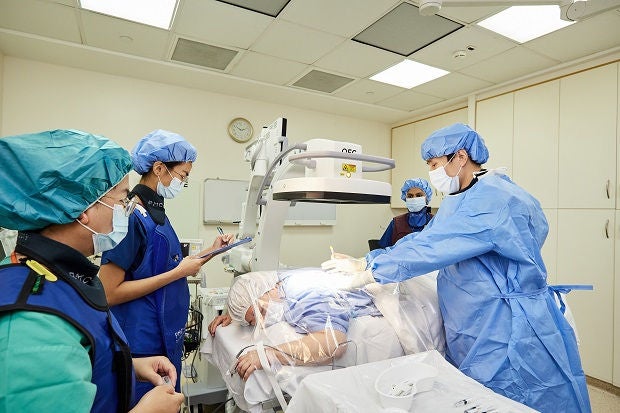
Doctors cure sometimes, treat often, but comfort always — and guided by that saying, Dr Lim Zhen Wei made the decision early in his career to practise anaesthesiology — and later to specialise in pain medicine.
The discipline fascinated him as he viewed anesthesiologists as being able to exercise exact control over the human body, and to practise medicine with what he describes as instant benefits for his patients.
“Anaesthesiologists play a very important role in making patients comfortable and lessening anxiety during and after surgery by precisely managing human physiology like blood pressure, breathing volume, and body temperature,” said Dr Lim, who is Consultant, Department of Pain Medicine, Pain Management Centre (PMC), Singapore General Hospital (SGH). “Pain medicine is a natural extension of practising anaesthesiology where I lessen patients’ pain, frequently after surgeries or secondary to another disease.”
Dr Lim feels a great sense of achievement when he can help his patients overcome their pain. “I once treated a 60-year-old who was limping into the procedure suite in the morning but was hopping out of PMC by lunchtime,” he said.
His patients are a diverse group, ranging from teenagers to nonagenarians, with complaints such as painful joints in their limbs and even the spine. Their pain might have resulted from sports activities, accidents, or just age-related wear-and-tear.
Most, however, seek help to manage
their pain because they are not keen on
more invasive treatments like surgery.
Dr Lim recalled a female patient in her
late 60s with osteoarthritis in both knees.
“She was petrified at the idea of undergoing
surgery. I did a right knee genicular nerve
ablation treatment and her knee pain was
reduced substantially,” he said.
Dr Lim used the same treatment on a
younger man in his early 40s who also had
knee pain. In his case, jogging, golf and other
activities had worn out his knees, causing
pain. The man did not want surgery as he
felt his symptoms were relatively mild.
After positioning a needle next to the nerve causing pain and numbing it with state-ofthe- art cooled radio frequency ablation, the patient was able to return to what he was doing before.
“Numbing the nerve — a pure sensory
nerve that does not supply any motor
function — reduces the pain,” said Dr Lim.

For many patients, having the pain reduced to a level that enables them to get on with life is sufficient. Making the patient more comfortable, even without correcting the underlying disease, is vital. The natural reaction of someone with a painful left knee is to use their right knee more to avoid putting pressure on the painful knee. But over time, the patient could start feeling pain in the right knee.
“It is important that we treat the pain early so that the patients can continue to maintain a balanced posture. It slows down the progression of the disease. For many patients, that is enough,” said Dr Lim.
Dr Lim sees the practice of medicine as both an art and science. So perhaps it is not surprising that he should have an interest in horology, the art of making clocks and watches.
“Other than good clinical acumen and skills, a good doctor must also be able to build rapport and make patients feel at ease. With advances in AI (artificial intelligence) and technology replacing many things in our lives, a good horological creation will remain relevant, just like a good doctor-patient therapeutic relationship, which cannot be replaced by AI,” he said.
Dr Lim, who shares young children — a girl and boy, aged five and two respectively — with his teacher wife, also enjoys travelling as a family. “Travelling helps us understand the world around us and gain perspective on our own lives by seeing what others are going through. It truly is another form of education. Most importantly, it makes memories that last a lifetime.”
Get the latest updates about Singapore Health in your mailbox! Click here to subscribe.













 Get it on Google Play
Get it on Google Play